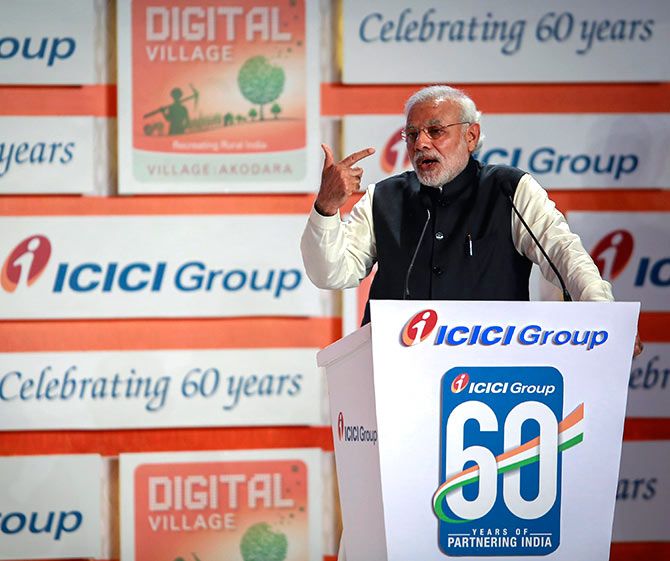Indian industry has accused Narendra Modi of not delivering, but he could not have delivered faster than he has done, argues Vikram Singh Mehta, Chairman, Brookings India. Aziz Haniffa/Rediff.com reports from Washington, DC.

Image: Prime Minister Narendra Modi at the 60th anniversary celebrations of ICICI Bank, India's largest private sector lender, in Mumbai on January 2, 2015. Photograph: Danish Siddiqui/Reuters.
Prime Minister Narendra Modi has a clear vision of what he wants for India, but the absence of big bang economic reforms and other priorities on his agenda is beset by political realities and vested interests, according to Vikram Singh Mehta, Chairman, Brookings India.
Mehta, who is also a Senior Fellow at Brookings, which hosted a conference assessing the first anniversary of the Modi government, asserted that the single window approval that US and Indian industry is hankering for, is a total illusion and will never happen and is best put to rest.
"The prime minister has a clear vision of what he wants and he has the clearest vision of anyone in the government today," Mehta said.
"He has dealt with economic policy for 15 years, he knows and he is thinking about what he wants to do for India for the last 10 years, and he is clear where he wants to go, where he wants to take the country."
"The fact that his reforms have not been fast-paced as some people have expected, is a reflection of the realities, the context, and the political economy -- call it what you want-- or the vested interests, whatever it is.
"It is a fact that the prime minister with a majority in the Lower House, no majority in the Rajya Sabha, federal polity, all sorts of disputes, and the RSS (Rashtriya Swayamsevak Sangh) sitting on top of his head, he can do nothing but move incrementally.
"Indian industry," Mehta noted, "have been impatient, and wrongly so. They have accused him of not having delivered, but he couldn’t have delivered faster than he has done."
Modi, Mehta argued, "has put the reform programme on the right track," while acknowledging, "we would all like some of those projects that are currently clogged by the bureaucratic processes and approvals to be unclogged, but that’s going to take time."
He pooh-poohed the clamouring for single window approval, saying, "There is no such thing as single window approval. Call it what you will, and you can talk about it till the cows come home, (but) you won’t get it, OK.
"You can’t pass a land bill out of Delhi and hope to implement it if the state governments are not going to be cooperative. You can’t talk about labour reform without the support of state governments, and you can’t talk about clean energy without the support of state governments.
"Remember, it’s one year into his regime and don’t forget, what we inherited -- it was an absolute and utter mess. To unclog just the mess that he inherited is going to take time," Mehta said.
"The country is moving forward," Mehta argued, "and on the economy, we have a prime minister who is clear-headed, with a very clear vision of where he wants to go forward and business will have to support him if they want to get what they want."
Before the interaction with the audience, in his preamble of Modi’s first year, Mehta declared, "Today, no one can point a finger at the prime minister and his administration regarding corruption. Crony capitalism has been disrupted and that’s a real major, positive step that has been taken."
But Milan Vaishnav, Associate at the Carnegie Endowment, took Mehta on during the interaction among the panelists and audience on the corruption issue, saying that "Modi’s speaking out has been largely symbolic."
Modi’s anti-corruption efforts like moving forward on auctions of natural resources like spectrum and coal, and mining rights, Vaishnav acknowledged, "which many times had been given to cronies, now has an auction mechanism."
But, Vaishnav argued, "The changes have to be much deeper. When you think about the rule of law landscape in India more broadly, from the outmoded kind of legal under-girding of society to the police, which are a very demoralised service to the judiciary, which is highly understaffed and overworked, to members of Parliament, who have criminal cases against them, including a significant percentage from the BJP, including those of a serious nature, these are all links to this chain that have to be addressed."
Thus, he said, "Just tackling one without moving on the others is not going to get the outcome."


.jpg)








 © 2025
© 2025